Report from ASM 2017: Planetary Health
Anthony BakerChair of the Local Organising Committee for ASM Hobart 2017
Microbiology Australia 38(3) 146-151 https://doi.org/10.1071/MA17053
Published: 25 August 2017
Despite a sudden cold snap enveloping much of southern Australia during the first week of July, 408 delegates converged on the Hobart waterfront at the Hotel Grand Chancellor for the Australian Society for Microbiology’s annual Scientific Meeting and Trade Exhibition. This year’s gathering was themed ‘Planetary Health’; a new discipline aiming to emphasise the interconnectedness of our civilisation with the natural biomes on which we depend. As microbiologists, we are acutely aware that it is often the invisible which underpin biological systems ranging from the small to a global scale.
EduCon, now in its fourth year, was held at the nearby Menzies Institute for Medical Research on the preceding Saturday. Always a great opportunity to discuss teaching practices and philosophies, it is encouraging to see EduCon growing to attract delegates from outside the field of microbiology. With a focus on emerging technology and tools in the digital era, the meeting attracted almost 20 delegates. We look forward to seeing it further develop in coming years.
Workshops running throughout Sunday were a success, with over 100 delegates in attendance. Confocal microscopy was a hit at the biofilm workshop, whilst this year saw the inclusion of a new writer’s corner workshop, which showcased publication opportunities outside of the traditional scientific writing format. In addition, workshops covering virology, antimicrobials, mycobacteria and clinical serology were run throughout the day. Workshops, as always, were organised and delivered by a dedicated group of volunteers; the standard was exceptional.
The public lecture was delivered on Sunday evening by Tony Capon, Professor of Planetary Health at the University of Sydney. Tony’s lecture outlined some of the enormous environmental and social challenges facing humankind. What began as a very sobering look at a potential future scenario for humankind, concluded with a message of broad optimism linked with human ingenuity and creativity to solve global problems, many of which can be tied to infectious diseases, broader public health and our other close relationships with microbes. It was pleasing to see so many members of the public in attendance at the public lecture, which speaks volumes of the community’s broad interest in science.
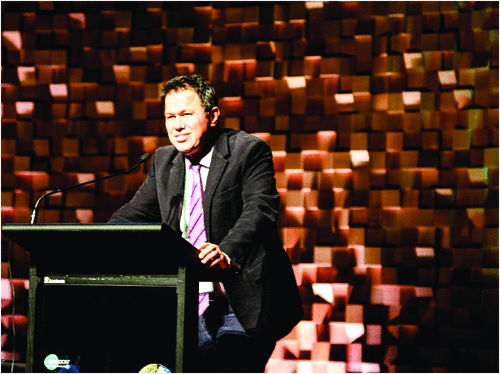
|
The official meeting opened following the public lecture with the annual ASM awards ceremony. The Bazeley Oration, an ongoing award supported by the Commonwealth Serum Laboratories, this year was delivered by Professor Mariagrazia Pizza, whose discussion about reverse vaccinology was both informative and engaging.
A welcome function featuring a ‘Tastes of Tasmania’ showcased some of the finest boutique food suppliers in the state. Samples for tasting included Tassal’s smoked salmon, Rhuby Delights chocolates, Frank’s Cider, Grandvewe Cheese’s sheep’s milk products and preserves from the Tasmanian Gourmet Sauce Company. Combined with the poster exhibition, the social event rounded off an excellent beginning to the meeting. The following three days of microbiology featured an incredibly diverse array of meetings, functions and presentations. Of note is the Nancy Millis student and ECR breakfast and lunch (now in their fifth year). It’s very pleasing to see these events being so well attended by our future scientific leaders.
The Rubbo Oration, annually supported by the Rubbo Trust, was this year delivered by Professor Pascale Cossart from the Institut Pasteur, who’s decades of research in the field of intracellular pathogenesis was brilliantly and enthusiastically communicated and included a visually stunning video presentation of a quality suitable for a TV documentary. The Rubbo Celebration dinner was held immediately afterwards with mood lighting, buffet dinner and private DJ. A digital ‘photo booth’ set-up outside the dinner venue complete with masks and other props had pictures of dressed up delegates streaming into the TV screens next to the dance floor. All in all, a great and fun night with many new acquaintances made. It is understood that a proportion of our delegates continued celebrations well into the night, spilling out into the streets of Hobart and on to other venues.
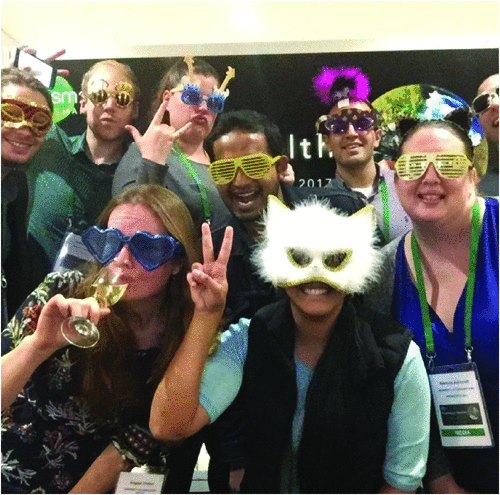
|
All in all, the standard of scientific research and presentations at this year’s meeting was truly exceptional. Symposium and proffered paper speakers delivered science of an excellent standard and showcased the diverse work that is carried out in our country. The quality and diversity of the food was outstanding and the social program was engaging and fun.
I would like to sincerely thank each of our speakers and delegates for their essential contribution to the event and the Hotel Grand Chancellor staff for their above and beyond level of service to this meeting. Furthermore, I’d like to thank our trade sponsors, whose ongoing support of the ASM is reflected in lower registration fees and an ability to bring eminent scientists from around the globe to the meeting. Many thanks go to the expert staff at ASN Events, the National Executive, Divisional Chairs, National Scientific Advisory Committee and Special Interest Groups. Finally, I’d like to personally thank my colleagues on the Local Organising Committee, for their dedication and support over the last couple of years toward making this conference happen. There have been many long discussions and late nights to pull it all together.
I look forward to catching up with you at next year’s ASM meeting to be held in Queensland at the Brisbane Convention Centre from the 1st to the 4th of July. Planning is well under way and I’ve been assured that the weather will be a little warmer.

|
Honorary Life Membership of the Australian Society for Microbiology
Pat Blackall
University of Queensland, QLD
Cheryl Power
University of Melbourne, VIC
New Fellows of the Australian Society for Microbiology
Anna Maria Costa
Royal Children’s Hospital, VIC
Dena Lyras
Monash University, VIC
ASM Distinguished Service Awards
Chris Burke
University of Tasmania, TAS
Charlene Kahler
University of Western Australia, WA
Ruth Hall
University of Sydney, NSW/NT
Clinical Travel Award: Lee-Ann Kirkham
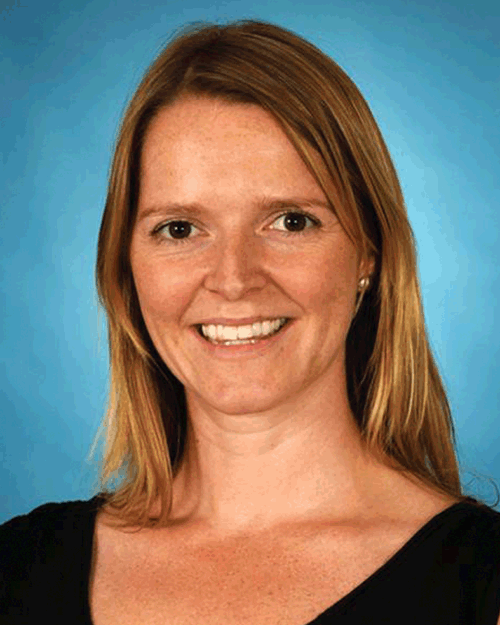
Dr Lea-Ann Kirkham is an NHMRC Career Development Fellow at the University of Western Australia and Microbiology Lead in the Wesfarmers Centre of Vaccines and Infectious Diseases at the Telethon Kids Institute, Perth, Western Australia. Her vision is to reduce the global burden of bacterial respiratory disease from nontypeable Haemophilus influenzae (NTHi) and Streptococcus pneumoniae (pneumococcus). Using her background in bacterial pathogenesis, vaccinology and molecular diagnostics, she is developing innovative strategies to improve diagnostics and develop therapies to target these pathogens.
Her PhD research at Glasgow University led to development of a vaccine for pneumococcal pneumonia and meningitis that is currently in clinical trials. Her research into the rise in febrile convulsions after the seasonal influenza vaccine in 2010 contributed to nationwide cessation of a particular flu vaccine for all children under 5 years of age. In 2011, her team’s research on identifying the predominant cause of ear infections in Australian children contributed to introduction of a new vaccine onto the National Immunisation Program. This vaccine has recently been shown to reduce ear infection rates in Indigenous Australian children.
ASM Jim Pittard Award: Si Min Man and Johanna Kenyon
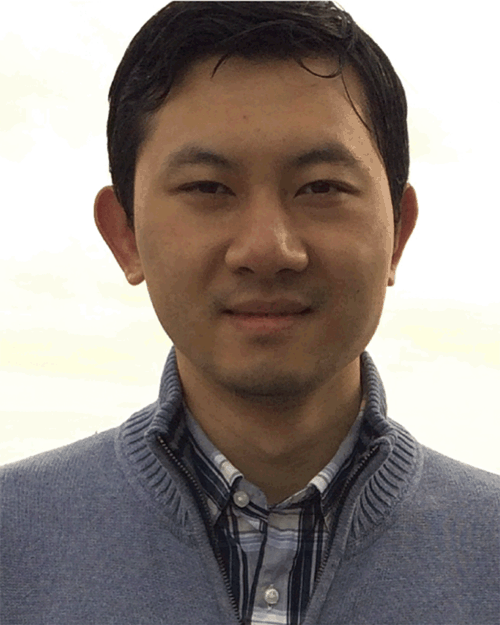
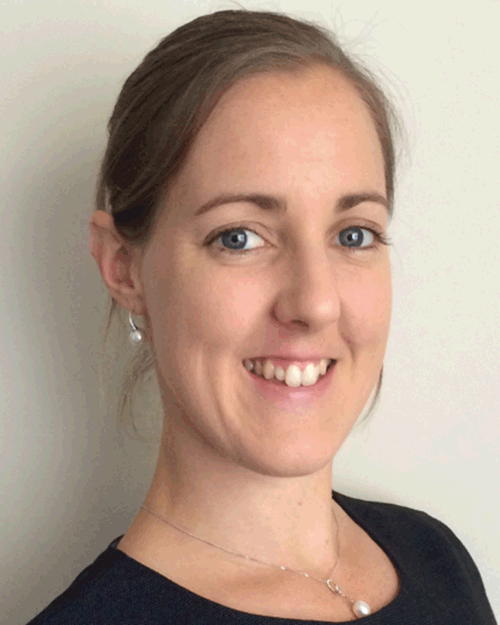
Si Ming received his PhD from the University of Cambridge, United Kingdom, for his work on inflammasomes in the host defence against Salmonella infection. He obtained his postdoctoral training from St Jude Children’s Research Hospital, USA, where he studied inflammasome signalling in the host response to infection and cancer. Currently, he is a Group Leader and an NHMRC RG Menzies Fellow at the Australian National University, Australia, where his laboratory focuses on innate immunity in the host defence against infectious diseases and the development of cancer and other chronic diseases.
Johanna completed her PhD in microbiology at The University of Sydney in 2012. Her PhD project, in the laboratory of Professor Peter Reeves FAA, investigating the genetics of polysaccharides produced by the bacterial pathogen, Yersinia pseudotuberculosis, fostered her interest in the complex genetics of bacterial surface polysaccharides. In 2012, she took up a postdoctoral position at The University of Sydney with Professor Ruth Hall OAM FAA, applying her skills in this field to a project that focused on unravelling the complexities of the genetics of surface polysaccharide production by the nosocomial pathogen, Acinetobacter baumannii using whole genome sequence data. Prior to this, little was known about A. baumannii polysaccharides, and her work established the foundations of this field. She established collaborations with specialists in Italy and Russia who were able to solve the carbohydrate structures bringing proof to pathway predictions. In 2015, she moved to a lecturing position at Queensland University of Technology in Brisbane, and formed the Bacterial Polysaccharides Research Group. She now leads her own research team, studying the genetics, biosynthesis and structure of polysaccharides from important Gram-negative pathogens, as well as their key roles in the success of pathogens in clinical environments. She maintains collaborations with the structural collaborators and with the Hall laboratory.
David White Excellence in Teaching Award: Karena Waller
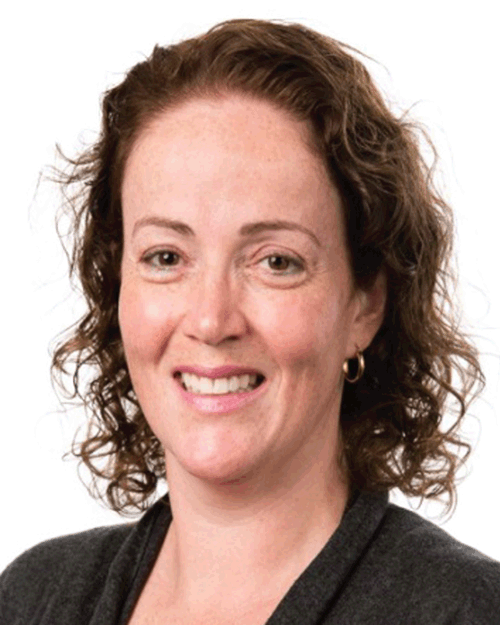
Dr Karena Waller is a Senior Lecturer in the Department of Microbiology and Immunology at The University of Melbourne. Karena joined the Department’s academic teaching staff in 2010 after 15 years in local and international malaria research. Today, Karena contributes significantly to the learning and teaching of microbiology and immunology to second and third year Bachelor of Science and Bachelor of Biomedicine students. In addition to her role as lecturer and subject coordinator, Karena is also the Academic Programs Coordinator, Majors Coordinator and the Exchange/Global Mobility Coordinator for the Department. Karena is also Chair of the Victorian Branch of the ASM and a member of the ASM NEQB Committee.
Teacher’s Travel Award: Andrew Greenhill
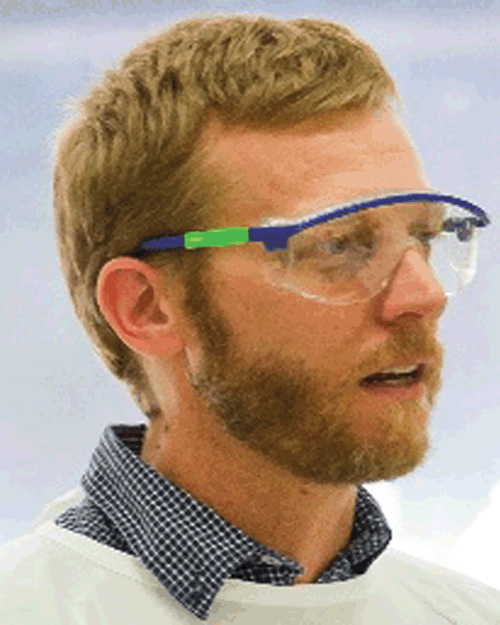
Dr Andrew Greenhill is a Senior Lecturer in Microbiology at Federation University Australia. Andrew’s academic life started as an underwhelming undergraduate student here in Hobart at the University of Tasmania. He then moved to James Cook University in Townsville for work and warm winters. At James Cook University he completed his PhD, while also gaining experience and skills in undergraduate education and post-graduate supervision. In 2008 Andrew convinced Suzie, his wife, that living in Papua New Guinea with a young family was a good idea. After four fulfilling years working at the Papua New Guinea Institute of Medical Research, Andrew and family returned to Australia to take up a role as Senior Lecturer at Monash University’s Gippsland campus.
bioMérieux ASM Identifying Resistance Award: John Merlino
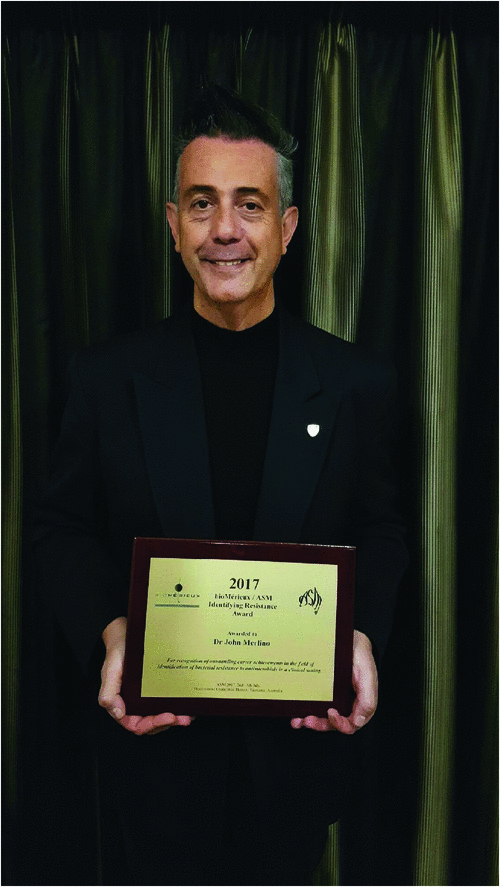
|
Dr John Merlino completed his Master of Science with Honours at Macquarie University on detection of vancomycin resistant entrocococci and later completed a PhD in Medicine in the Faculty of Medicine, Department of Infectious Diseases and Immunology of the University of Sydney on detection of MRSA. He completed his FASM on antimicrobial resistance in Staphylococcus aureus in 2004. He lectures at the University of Sydney and is also Founding Fellow of the Faculty of Science of the Royal College of Pathologists Australasia. He received several awards on detection of antimicrobial resistance with several publications in the area. He has been the chair and convenor of the ASM Antimicrobial Special Interest Group since 2002 – one of the largest SIG within the Australian Society for Microbiology, organising several workshops and symposia on antimicrobial resistance detection and reporting in medical laboratories.
ASM Frank Fenner Award: Hayley Newton and Catherine Satzke
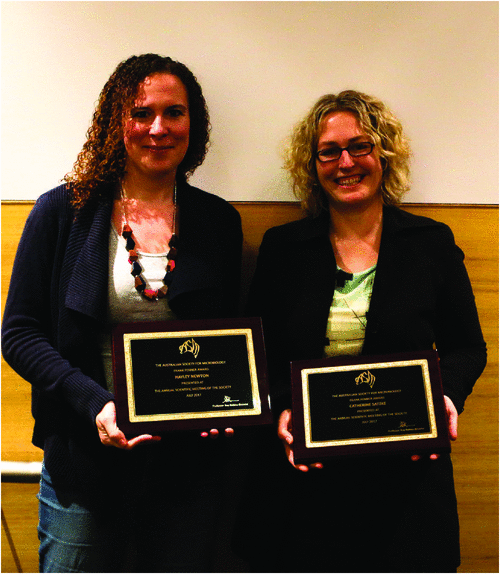
|
Dr Hayley Newton completed her PhD at Monash University in 2007 under the supervision of Professor Liz Hartland. During her PhD, Hayley was awarded the prestigious Victoria Fellowship and AFAS-FEAST Fellowship, allowing her to extend her studies on Legionella pneumophila to a global network of laboratories. Subsequently, Hayley was awarded a NHMRC Training Fellowship to undertake postdoctoral research overseas. In 2009, she commenced the fellowship within the laboratory of Professor Craig Roy at Yale University, where she worked extensively to develop an understanding of the pathogenesis of the intracellular bacterial pathogen Coxiella burnetii. During this period, Hayley developed pioneering techniques to genetically manipulate Coxiella burnetii and demonstrated that the Dot/Icm type IV secretion system is an essential virulence determinant. These findings have led to a significant shift in our understanding of this mysterious intracellular pathogen.
Hayley moved to the Department of Microbiology and Immunology, University of Melbourne, at the Peter Doherty Institute in 2013. She has established a research program examining the virulence strategies of intracellular bacterial pathogens. Hayley currently holds a teaching/research academic position within the Department and is the Co-Theme leader for Host-Pathogen Interactions for the Doherty Institute.
Dr Catherine Satzke is a Senior Research Fellow at the Murdoch Childrens Research Institute and has honorary positions at The University of Melbourne, where she completed her PhD in 2007 with Professor Roy Robins-Browne. Her current research examines the impact of vaccines on pneumococcal carriage, transmission and disease, spanning both laboratory and translational science. Catherine collaborates widely with researchers from high and low-income settings, including clinicians, epidemiologists and immunologists. She leads microbiological outcomes for vaccine studies including in Fiji, Lao PDR, Mongolia and Vietnam led by Professor Kim Mulholland and A/Professor Fiona Russell within the Pneumococcal Research Group at MCRI. Other highlights include leading the development of World Health Organization guidelines for pneumococcal carriage, and establishment of global standards for pneumococcal serotyping for carriage studies with the Bill and Melinda Gates Foundation. Catherine is a NHMRC Career Development, and an inaugural veski ‘inspiring women’ Fellow. Her research is supported by national and international funders, the latter including the Bill and Melinda Gates Foundation, PATH, Gavi Alliance and the WHO.
ASM Lyn Gilbert Award: David Whiley
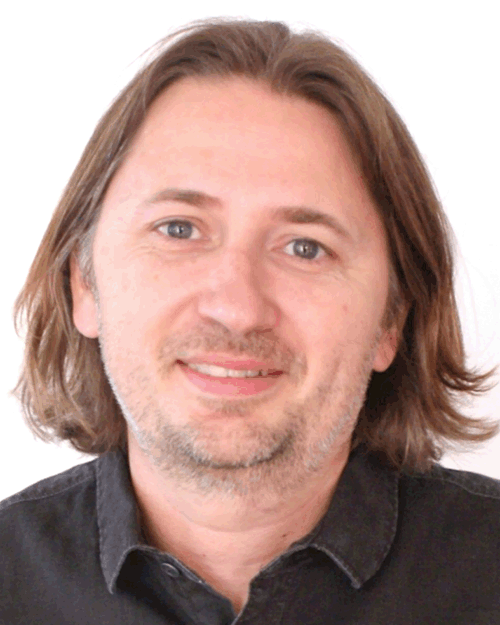
Associate Professor David Whiley is a principal research fellow at the UQ Centre for Clinical Research, The University of Queensland and research scientist at Pathology Queensland. Much of his work is aimed at enhancing the capacity of clinical laboratories to diagnose, identify and characterise pathogens, with a particular research emphasis on sexually transmitted infections and antimicrobial resistance. He has authored 146 articles and currently holds an NHMRC Career development Fellowship level 2. In recent years A/Professor Whiley has been leading the NHMRC-funded Gonorrhoea Resistance Assessment via Nucleic Acid Detection (GRAND) studies that aim to enhance gonorrhoea antimicrobial resistance surveillance and treatment strategies, particularly in remote settings.
BD ASM Student Travel Awardees
Victoria
Claire Gorrie
University of Melbourne
South Australia/Northern Territory
Matthew Macowan
University of Adelaide
New South Wales/ACT
Riti Mann
University of Technology, Sydney
Tasmania
Roger Latham
University of Tasmania
Queensland
Melinda Ashcroft
University of Queensland
Western Australia
Shakeel Mowlaboccus
University of Western Australia

|


